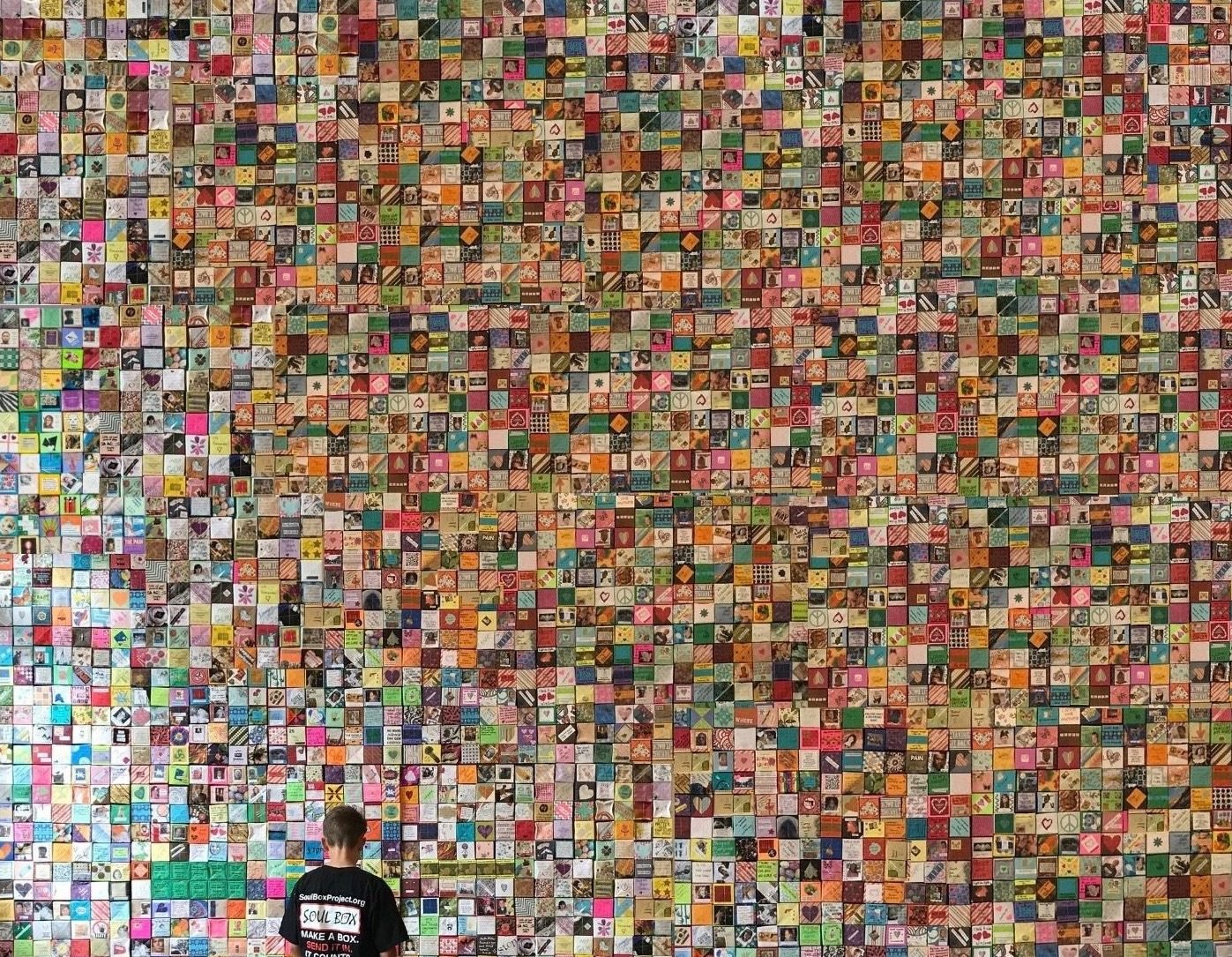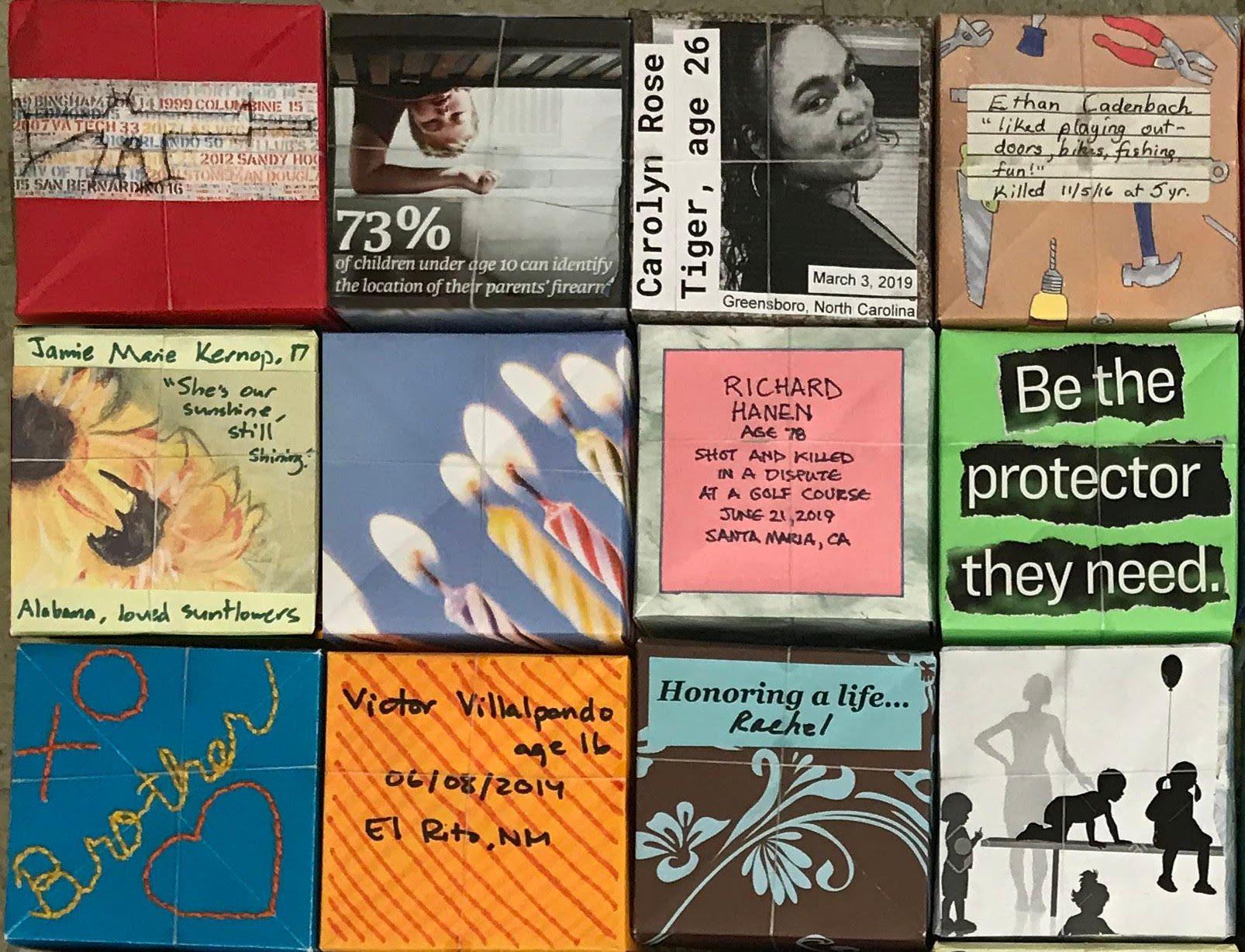The Soul Box Project
Exhibit of Soul Boxes
By Anna Van Boven and Karla Niehus
In October 2017, Portland artist Leslie Lee wanted to turn away from news of the Las Vegas mass shooting–yet another occurrence of too many deaths and injuries. She wasn’t aware of psychic numbing, but intuitively grasped the phenomenon and created The Soul Box Project to show the numbers, so people could feel the scale on a visceral level...and then be motivated to take some kind of action.
Lee’s invitation spread across the country: make and send in origami boxes to count and represent gunfire deaths and injuries. Churches, activist groups, high school students, and individuals in 39 states responded. Some contributors made a Box for a loved one taken too soon. Many volunteers deepened their engagement by making Boxes for victims they never met. Utilizing the Gun Violence Archive, they inscribed not only a name, but a personal detail they learned about the individual. By October 2021, The Soul Box Project had collected the 200,000 origami boxes needed to visualize three years of U.S. deaths and injuries. Volunteers gathered in Washington, D.C., and achieved the goal to raise awareness with an exhibit spanning the width of the National Mall.
The Soul Box Project's This Loss We Carry, an exhibit of 200,000 origami boxes representing the number of U.S. gunfire deaths and injuries in three years. National Mall, Washington, D.C., October 2021.
Smaller exhibitions and events utilizing portions of the collection and Soul Boxes made on location have continued. Soul Boxes are currently on view in Pawtucket, Rhode Island, and Atlanta, Georgia. The panels displayed in D.C. are now being made available for “adoption” across the country by entities that can utilize this powerful visual in their efforts to reduce gun violence.
The Arithmetic of Compassion website frequently addresses the issue of gun violence, because it is such a prominent display of psychic numbing and pseudoinefficacy. Many gun violence occurrences are followed by narrative press coverage that elicits a widespread emotional reaction, but they are rarely followed by policy change. In part, this is due to psychic numbing: we interpret the numbers that represent gun violence victims differently than we interpret a person’s story, which causes us to care less when we are faced with the statistics of such a large-scale issue. The Soul Box Project is a prime example of the first step in overcoming psychic numbing, which is to make the effort to connect with the people that the numbers represent. When folding a Box and personalizing it with the name of a victim, the creator takes the time to establish a connection to an individual victimized by gun violence. Leslie Lee received feedback from many contributors who said that creating the Boxes helped them in different ways. People who had lost someone to gun violence found the process of folding provided them solace. One contributor said, “These Soul Boxes made me think: each person who made a Box has felt the pain of a lost soul.” This quote perfectly exemplifies how creating these Boxes can help combat psychic numbing. During the pandemic, participants told Lee that making Soul Boxes felt like something important they could contribute at a time when they felt isolated and powerless. This is the feeling of pseudoinefficacy, when there seems to be nothing that an individual can do to fix a large-scale problem, so instead they do nothing. Finding smaller ways to contribute to a solution and accepting that small improvements still help those who suffer is the first step to combating pseudoinefficacy.
Soul Boxes were made and sent to Portland, Oregon, from 39 states to be part of The Soul Box Project, a nationwide, collaborative art project to show the scale of the U.S. gunfire epidemic.
The Soul Box Project is an impressive example of how contributing to a solution in a small way–like folding a paper box–can have a positive impact on an individual and help overcome detrimental psychological tendencies. The project is ongoing, and the website offers many ways to get involved, including folding boxes, hosting box-folding events and Soul Box exhibits, and donating to the project.



